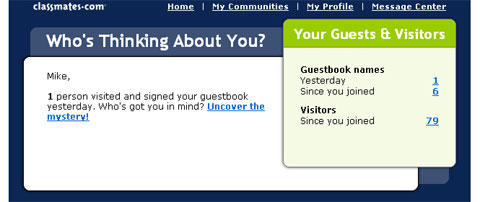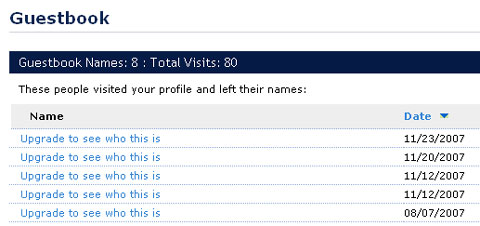Do you pay for Classmates.com?
Classmates.com was a social network before the term existed. The Web-based service to connect fellow graduates and alumni of schools, colleges and businesses began in 1995, and today they are owned by the group that owns NetZero among other companies. It has comparative features to other services like LinkedIn and Facebook, but has a much different business model.
I am considering deleting my profile from Classmates.com and thus I have written this post – do you pay for Classmates com? In order for you to interact with anyone on the site, you have to pay. It is free to setup and edit your profile, but if someone sends you a message, you can’t see it unless you are a paying customer.
Here’s an example. I get regular emails from them, and here’s a segment of the latest one:

Someone signed my guestbook – cool. So who did? When I click the link to get to the Web site, here’s a segment of the Web page I get:

In order for me to see who has signed my guestbook, I have to pay. Of course I have no idea who signed it, if they are someone I know or if it is spam or a legitimate message.
Classmates.com has lowered their annual cost to $9.95 from $39. But between LinkedIn, et. al. and a Web site I helped create for my high school class, is this really worth it? Isn’t my profile in Classmates.com worth more to them? For if I and others leave, wouldn’t the site becomes less valuable?
With the proliferation of social networking sites, how many can you really be active on? I am not on Facebook or others daily, and on LinkedIn I usually check the home page for updates every few days. Is Classmates.com worth the cost to you?
Business • Technology • (0) Comments • PermalinkGift Idea – A One Laptop Per Child Computer
 You have only through the end of the year to buy a truly unique gift – the One Laptop Per Child computer. Originally billed as the $100 notebook computer to give to children in developing countries, the cost is a little higher, and this offer allows you to buy one for yourself while at the same time buying one for a child.
You have only through the end of the year to buy a truly unique gift – the One Laptop Per Child computer. Originally billed as the $100 notebook computer to give to children in developing countries, the cost is a little higher, and this offer allows you to buy one for yourself while at the same time buying one for a child.
For $399 plus shipping, I will get a green XO notebook computer that runs Linux with unique and useful software – more information on the machine is on their Web site. As you get one for yourself or someone else, you can deduct from your taxes $200.
I ordered one myself, and am awaiting its arrival. As someone who got into computers at a young age and made a career out of it, I appreciate the need for children to be exposed to technology early on. It is a unique item that I will be able to use for my consulting business, Dunkirk Systems, as I can test and present Web sites on it.
Business • Technology • (0) Comments • PermalinkObservations of German Domain Names
 As much as I write about domain names, it probably comes as no surprise I think about them and notice them more. On a recent vacation to Germany, I made many observations on them, and to the fortune of myself and my wife, they did not disrupt the trip. Well, not too much.
As much as I write about domain names, it probably comes as no surprise I think about them and notice them more. On a recent vacation to Germany, I made many observations on them, and to the fortune of myself and my wife, they did not disrupt the trip. Well, not too much.
One observation I made was the wide use of the German ccTLD of .de. A ccTLD is a country code top-level domain,. A top-level domain is commonly referred to as the domain name extension. Where .com, etc. can be used throughout the world, a ccTLD is ideally designated for an entity in a particular country. Most all of the observations I made of domain names had them ending in .de, both for German-based entities as well as international entities and brands. This was similar to the observations I made in Denmark the year before, where most all domain names ended in .dk.
I can see this for 2 reasons. The first is to direct a German language reader directly to German content on the Web site of an international brand. Have you ever gone to a Web site and the first thing you are presented with is a list of continents or countries for you to select before you get to any content? Identifying a user coming from Germany would lead them to German content, with the occasional option to select other languages. The second is national pride. It can be inferred that though .com is international, it originated in and is predominately used for US Web sites. It also adds a deeper level of identification that it is used by a German entity.
A second observation I made was the widespread use of dashes in domain names. I have a few photos of domain names in action, which represent only a handful of what I observed over the course of the trip. Where dashes can make for a more visually pleasing domain name display, it is easy to forget about them when recalling them from memory or when typing them. In the case of these particular names, a version of the domain names without dashes is not registered.
Whenever I work with a client to select domain names, I recommend they avoid dashes for the reason I mentioned above. I do have some clients who have them and use them, however they have been in use for many years, and in those cases alternate names redirect to the Web sites as well.
If anyone reading has any information or insight into the use of dashes in domain names in Germany, please comment to this post.
Domain Names • Technology • (14) Comments • PermalinkBusiness Tools Based On Business Needs
Having the best tools to get work done for my clients is what I strive for. Paying for them is sometimes a challenge, taking all other costs I have into consideration. This is where I have to justify if the tool, whether is is hardware, software or what have you, will make me more productive or give me a competitive advantage.
As a small business owner I have the luxury of making these decisions. Over the years of working for others, this decision making varied. Sometimes my immediate manager would make the decision. In this case the request process was generally fair, especially for the managers who actually knew what I did on a daily basis.
Some of the companies I worked for – usually the larger ones – made these decisions based on blanket policies that set justification based on your title or position and not on business need. Such a policy assumes upper management are typically the ones that need and will use more advanced tools. Whether or not they actually use them at all or to their fullest is more than likely never followed up on. If you try getting any particular tool whose distribution was based on such arcane rules – forget about it, no matter how well you are able to justify its need it will fail.
I have personally encountered this over the years in requests for business cards, email access, software, access to the company’s VPN to work from home, a notebook computer (when I was traveling for work), a decent-sized monitor and a mobile device for email. Though these requests spanned a period of almost 2 decades, I continue to hear such stories today from others.
Such policies are driven by the desire to control costs, and the only costs being monitored are cash expenditures. Opportunity cost is never usually taken into consideration. How much less productive is an employee when they do not have a tool to be more efficient? How about their overall team? Or how about opportunities lost when people are not able to get in touch with people outside the office who do not have a mobile device to reach co-workers? And don’t forget the cost of rehiring an employee who leaves a job if they feel they are not respected to handle the "fancy toys" their managers have.
With the season of generosity around the corner, managers and companies should take a hard look at what it really costs to be in business and not be penny wise and pound foolish.
Business • Technology • (0) Comments • PermalinkMandated Email Forwarding Not The Best Choice
A petition was recently filed with the Federal Communications (FCC) by Gail Mortenson, a freelance writer who abruptly had her AOL account terminated, and as a result her email address was no longer valid. She has claimed this has been a detriment to her business, a point nobody could argue with. Changing your email address can be a painful process. As it is so easy to give out your email address, you can never know who may try to email you after you have changed your address and no longer have the old address.
The need to change an email address usually comes when you change jobs or change Internet providers. For the former, using a personal email address will eliminate missing personal communications. And with regards to the personal email address, I have written before that you should own your own domain name to ensure you always receive your personal email and not rely to your detriment on the email provider, whether it’s Hotmail, GMail, etc., as you do not have full control over your email address.
Mandating by law Internet and email providers to forward email may be good and straightforward in theory; however it will not work on several fronts. First there is the issue of email traffic and bandwidth, which comes at a cost to the provider and would likely be passed on to customers. Where some could see this as a vital service, I see it more as a value-added optional service, something providers could charge money for – something I am surprised they haven’t been doing all the long, especially with people leaving AOL in droves! I also disagree with the analogy to forwarding physical, US Mail, as I can tell you personally that this does not always work!
The best way to handle this is to register your own domain name and have your email go to an address at the name. A domain name is portable and separate from your Internet provider. You could choose to have an email alias or a mailbox. The flexibility is there for a small amount of cost, much less than what I would assume a provider would charge for email forwarding.
Naturally when I saw this story I checked if the domain name gailmortenson.com was registered. It is and appears to be in the name of an Internet provider in Maryland, near where Ms. Mortenson lives. Maybe she read The Hot Iron previously and decided to make the right move?
Domain Names • Technology • (2) Comments • Permalink
